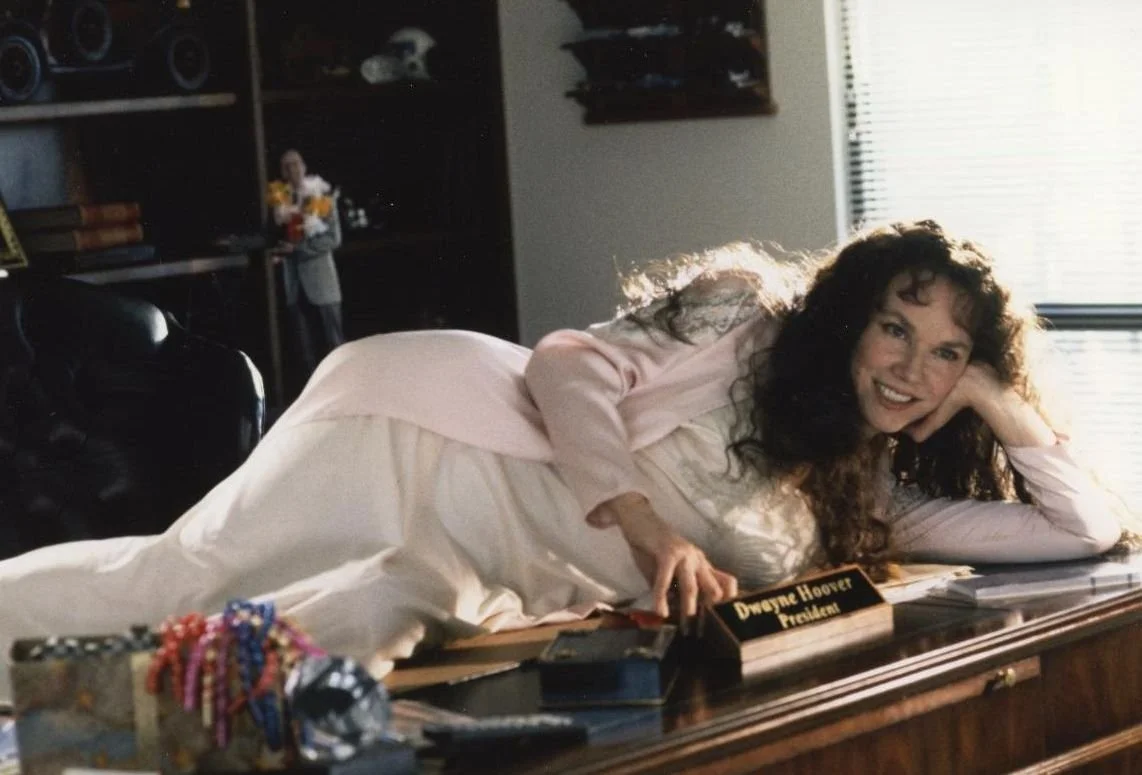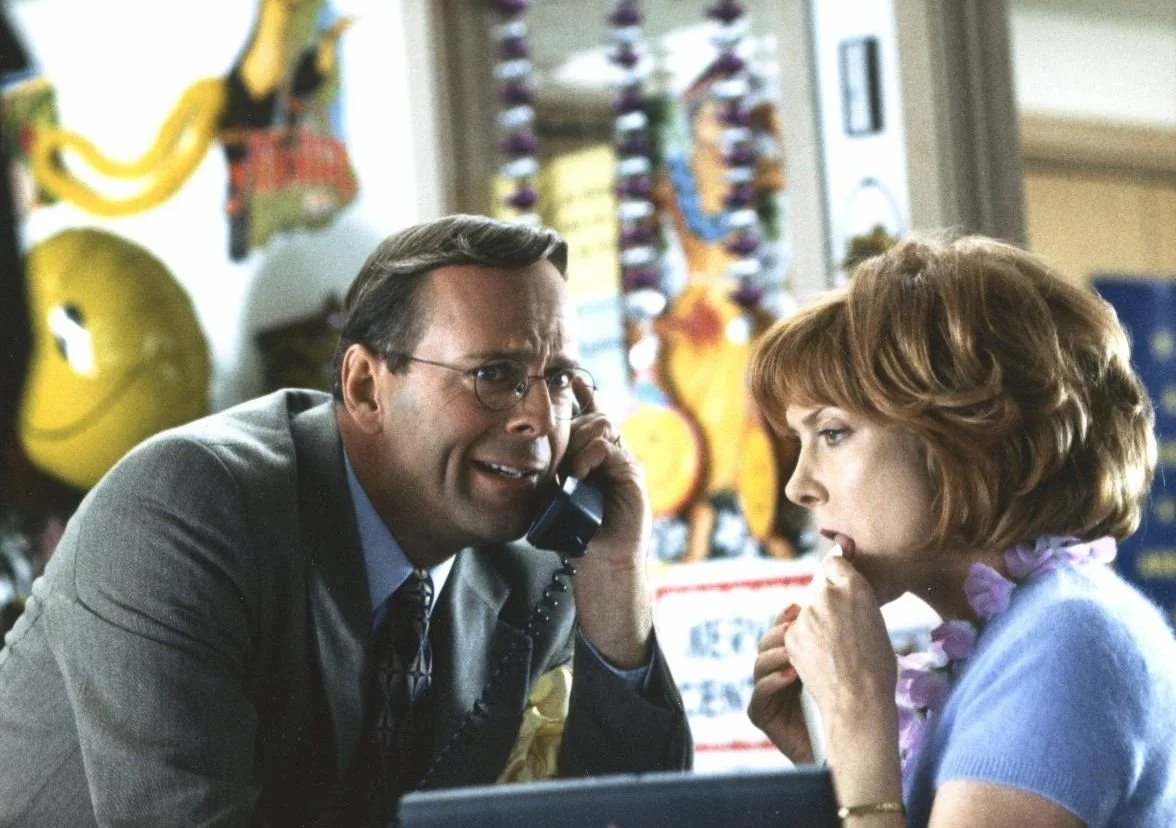Exclusive: Director Alan Rudolph on Breakfast of Champions Re-Release
This weekend a long-forgotten literary adaptation gets a second lease on life as Shout! Studios unveils the new 4K restoration of director Alan Rudolph's Breakfast of Champions to theaters. Based on Kurt Vonnegut Jr.'s classic 1973 novel, the story follows Dwayne Hoover (Bruce Willis), a local car sales magnate whose mind has unraveled since the death of his wife (Barbara Hershey). Over the course of several days he must contend with a secretly cross-dressing sales manager (Nick Nolte), a lounge singer son (Lukas Haas), a ditzy secretary/girlfriend (Glenne Headly), and an obsessed ex-con (Omar Epps). Meanwhile, a fateful confrontation with a disgruntled sci-fi writer named Kilgore Trout (Albert Finney) looms.
Released to savage reviews and non-existent box office in 1999, Breakfast of Champions was dumped by its studio and largely ignored in the years since. It's a wildly eccentric and deeply cynical movie, to be sure, but it also contains a refreshingly zany point of view and a brilliant cast, which also includes Buck Henry, Owen Wilson, Michael Jai White, Michael Clarke Duncan, and a brief cameo by Vonnegut himself.
As Rudolph himself told us, "I refer to it as the most reviled film in modern American cinema, and my personal greatest achievement. I'm so proud of that film."
Rudolph, who made art house hits like Mrs. Parker and the Vicious Circle and Afterglow, has a right to be proud, as he spent over two decades attempting to bring it to the screen. He originally wrote the Breakfast of Champions screenplay adaptation for his mentor Robert Altman to direct. The potential cast included Burt Lancaster or Sterling Hayden as Kilgore, Peter Falk as Dwayne, and Lily Tomlin in multiple roles. Producer Dino De Laurentiis was going to finance it, but after the failure of Altman's 1976 western Buffalo Bill and the Indians, or Sitting Bull's History Lesson, those plans fell through.
"I wrote it for Altman right after Nashville," Rudolph explained. "Everybody says, 'Oh, this is impossible.' He had writers working on it who couldn't crack it, and he just turned to me. 'Read this and see if you can write something.' I did, because it was Bob, I knew he would fix it. So I said, 'If you really adapted this thing and were true to it, you'd have to make it a biography of Vonnegut, really.' He's the inner voice and the surrogate character is there, and he uses his alias sometimes, but it's really about his take on things. Altman said, 'I don't want to do that. I just want to focus on the characters and see if I can hammer a story out of it.' I did. He liked it. They tried to get it made it, didn't, he let it go."
In 1977 Rudolph told Pittsburgh Press, "Making a movie of that will be a possibility as long as I'm alive. Bob Altman may do it himself. If he doesn't, I'd still like to. Everyone says it's the best script I've written. Bob is determined to see it made, and I have a feeling it will be." Cut to decades later, around 1997, and Rudolph gets a fateful call from superstar Bruce Willis, whom he had directed previously in the 1991 thriller Mortal Thoughts.
"He was most proud of the thing we had done before, for his acting, because he could finally do what he wanted to do," Rudolph says of Willis in that film. "I was actually talking to Altman. I got a call, and I said, 'Bob, I think I have to take this.' He says, 'Fine, I have to go somewhere.' So I clicked him off and clicked on the other line, and when Altman was clicking off, the guy on the other end said, 'Hi, this is…' and all I heard was 'click.' I said, 'I'm sorry, who is this?' 'He says, 'Bruce Willis. You remember? I had a few hits in the 80's? Listen, I'm going to get right to it: I want to make a flat out comedy. I want to make a comedy in my life now, and I've optioned Breakfast of Champions. I read your script, I laughed. Let's make it as soon as possible.' Now, you don't get those calls. You just don't. I said, 'Well, great. Where are you going to get the money? Nobody's going to want to make this.' He said, 'Don't worry about that. We're just going to have to do it low budget, but I'll get you the money, no interference. We need to get it together as soon as possible.' Maybe that was November or December, and I think we were shooting by spring."
Many critics, including Vonnegut himself, later excoriated the film for not necessarily following the tone of the book. Rudolph found the book would have been impossible to adapt without making it his own, which is what he did.
"I wanted to make it funny, hilarious even, and serious at the same time," he explained. "I thought our culture in the 1990's, after having been through Reagan and Clinton's promises -but who knows about the delivery of those promises- that people kind of felt the same way, and I thought I'd show them what it was like under the tent. It was still a nation of sheep, and here we are 25 years later… it might actually have been a prescient film. That was the whole thing to me, is we're all crazy. Everyone's eccentric, and society brings us to conform to the norm. You make a deal with your own identity to become that, otherwise people would be individuals… we can't have that. You've got Kilgore saying, 'it's madness out there, it's chaos, trust yourself, free will…' I thought everybody felt that way, even in the 70's when Kurt articulated it. Wrong again, Alan."
While Willis may have been known for playing tough guys with guns in action roles like Armageddon and the Die Hard movies, Rudolph elicited a much more vulnerable performance from him as Dwayne Hoover, a man hanging by an emotional thread and looking for answers.
"I don't usually talk like this to actors, but I told Bruce, 'you're playing a politician,'" Rudolph remembers. "Every politician will give you hollow promises and say, 'trust me,' and they'll skirt around the actual truth. They are enamored of their own success, their own fame, their own wealth. Dwayne is a guy who one day wakes up and something inside of him starts to question it, but because he's gotten to the place he is with no inner work whatsoever -no enlightenment, no identity that's attached to a truth, a truth of the soul, the spirit- he has nothing to draw upon. So he, like everyone else, looks for someone else to give him an answer. And of course, he picks a guy [Kilgore Trout] who spouts nonsense and then misinterprets it."
On Breakfast Rudolph was working with his biggest budget to-date, around $9 million, shooting on location with a large ensemble all working for scale. He used a lot of visual invention and Kabuki theater-level heightened performances to create Vonnegut's absurdist world, but audiences largely rejected the approach. Hopefully with the restoration and re-release they will get a second chance to witness Rudolph's funhouse mirror reflection of America.
"There was a tone of the film to keep it funny, but not at the expense of the seriousness of it," he said. "Probably what the problem was at the time was the audience didn't have an easy way in. They didn't have the character they could relate to. They had to accept the cynicism, the madness, the absurdity of our American life. They had to accept that going in, and I found that nobody wanted to accept that. They want to be sheep. When I first started making movies, I had to look up the word 'quirky,' because that's all everybody ever said about my films. Then I wore it as a badge of honor. 'Oh, well, at least they're not normal or common or average.'"






